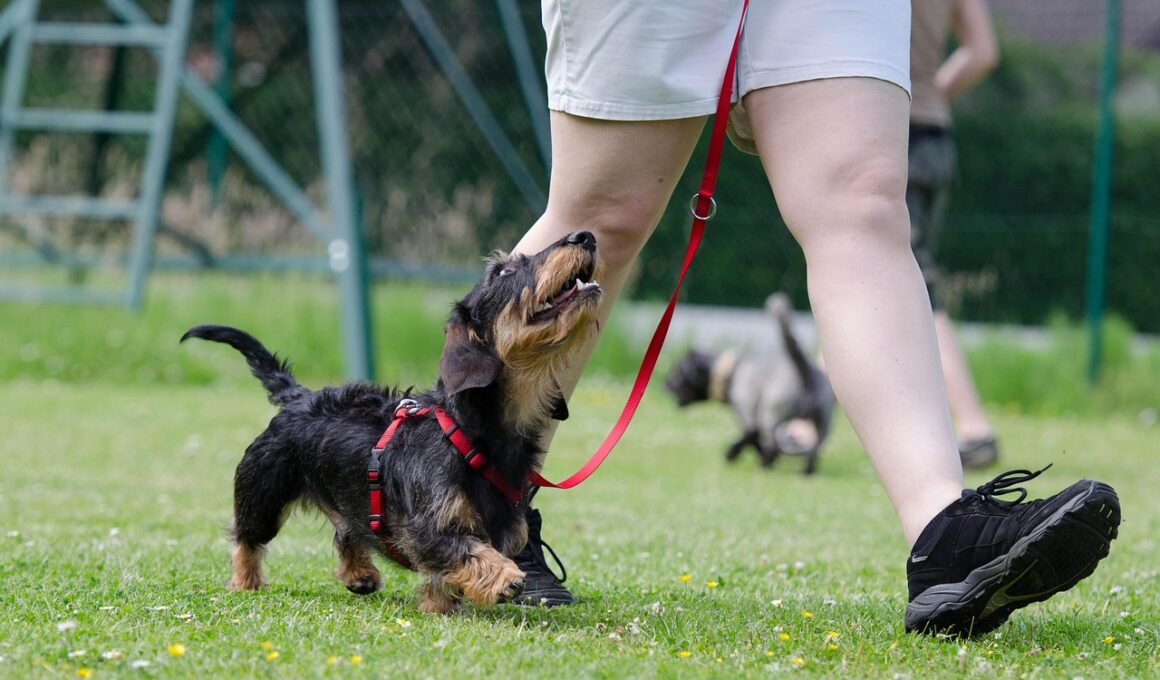When to Consult a Professional Trainer or Behaviorist
Introducing a new pet into your home brings immense joy, but it can also present challenges. Recognizing when to consult a professional dog trainer or behaviorist is crucial for the well-being of both your new pet and existing pets. Initial signs of behavioral issues should not be ignored, as they can evolve into more significant problems if left unaddressed. Situations like aggression, excessive barking, or fear of humans and other pets can create tensions and risk a safe home environment. Understanding your dog’s body language and vocalizations can provide insight into their comfort level or distress. Taking the time to assess your dog’s reactions to various stimuli also becomes essential during this adjustment period. Often, new pets may simply need time to acclimatize. Nevertheless, if negative behaviors escalate rather than diminish after some weeks, it is a strong indicator that professional assistance may be required. Engaging with a trainer can help translate canine behavior into understandable terms while introducing effective strategies for improvement. By addressing issues early, you can foster a harmonious relationship between pets and owners.
Furthermore, consulting a professional trainer can bring significant advantages beyond resolving behavioral issues. Trainers possess valuable skills and experiences that can guide you in creating a structured training environment. One of the most common recommendations is to engage in a personalized training program that caters specifically to your dog’s needs. A professional will assess your dog’s temperament, behavior, and unique challenges, informing the training approach adopted. Comprehensive training programs can include socialization skills, obedience training, and leash manners. Additionally, owners can benefit from learning effective communication techniques essential for building trust with their pets. Group classes can also be advantageous for socializing a new dog with other canines, thereby reducing fear or anxiety in unfamiliar settings. Classes foster interaction and offer invaluable experiences that are essential for proper social development. They further help create sound, positive interactions, guiding your dog on navigating various environments. In this collaborative effort, the professional trainer’s role transcends beyond correction, encompassing teaching owners how to engage sustainably with their pets while establishing a solid foundation of disciplined behavior.
Signs Your Pet May Need Professional Help
Identifying significant behavioral issues can be daunting, but there are prominent indicators that your dog may require professional help. For instance, sudden aggression towards people or other animals is a red flag that should never be overlooked. Additionally, if your dog displays signs of anxiety, such as excessive panting, whining, or even growling, it often signifies underlying stress or fear. An untreated dog suffering from anxiety may develop even further complications, including destructive behaviors or refusal to eat. Changes in behavior can range from aggression to withdrawal, where a previously playful dog suddenly shows little interest in activities. Such behavioral shifts can indicate the onset of sadness or health-related problems. Further cues such as significant changes in appetite, avoidance of interaction, or excessive barking can signal either stress, discomfort, or pain. Each of these signs presents an opportunity to seek a profitably trained professional. The verdict is simple; if your pet’s behavior is affecting daily life or relationships within your household, consulting a behaviorist is wise.
Moreover, understanding the various types of professionals available can also empower you in deciding the best pathway forward for your pet. Many dog trainers specialize in different approaches, including positive reinforcement, dominance-based training, or focus on behavioral modification strategies. This variety allows you to choose a trainer whose methods align with your training philosophy and your dog’s needs. Behaviorists, frequently certified, take a deep dive into behavioral science to address the underlying causes of problematic behaviors through a more holistic lens, as opposed to just correcting them. They often work with dogs that deal with anxiety or aggression issues, developing tailored behavior modification plans to facilitate enduring changes. Furthermore, seeking referrals from veterinarians or local pet organizations offers insights into capable trainers and behaviorists. Online platforms also provide ratings and reviews, helping delineate the best specialists available in your locality. This research ensures you’re well-informed and confident about their approach before finalizing your choice, thus allowing for a structured upbringing that sustains both physical and emotional well-being.
The Importance of Early Intervention
Early intervention is critical when dealing with behavioral problems. The longer problematic behavior persists without feedback or guidance, the deeper the issue may become ingrained in your dog’s habits. Not only can early lessons help curb poor behavior, but they can also set a foundational structure for your pet’s future conduct. Understanding the importance of timely intervention can also prevent potential incidents, helping ensure safe interactions between pets, children, and visitors to your home. Additionally, recognizing traumas or apprehensions early on can prevent long-standing fear or anxiety in the future. Beyond merely correcting behaviors, creating a comfortable environment that supports your new dog as they adapt enhances their sense of safety and belonging, which is essential for loyal companionship. In fostering this supportive environment, you allow the opportunity for both your new dog and existing pets to coexist positively. Opening avenues for early training also encourages responsible pet ownership, setting clear expectations from the start that benefits relationships among family members. The culmination of consistent training efforts nurtures well-rounded canine companions that enrich your households.
Finally, investing time and effort in your dog’s training journey yields long-term benefits. The bond shared between owner and pet hinges upon good communication methods and trust, which builds excitement for participation in training routines. Moreover, a well-trained dog is generally seen as a reflection of responsible ownership, which leads to positive social perceptions within the community. Your dog can partake in activities that enhance mental stimulation, such as obedience competition or exploring agility training. Engaging together in fun, productive activities strengthens your relationship further, fostering enjoyable interactions for both parties involved. As you equip your dog with essential life skills through training, not only do you decrease problematic behaviors, but you also enrich their quality of life. The right training ultimately enables a smoother experience during interactions in diverse environments. Developing these well-rounded, versatile life skills contributes to your dog’s happiness and overall well-being. Thus, the recommendation persists: consider consulting a professional trainer if you’re navigating pet behaviors for a rewarding partnership.
Conclusion
In conclusion, the journey towards pet ownership encompasses numerous challenges when introducing a new dog. While new pets harbor excitement, they also present unforeseen adjustments that may require professional assistance. Knowing when to consult a trainer or behaviorist ultimately contributes to your pet’s quality of life. Early recognition coupled with intervention nullifies longstanding behavioral issues, paving the way for a well-balanced relationship. The principles of comprehensively understanding your pet allow owners to remedy dysfunctions effectively, leading to happier homes. By nurturing your dog’s emotional and physical needs through training and socialization, you are not only embracing responsible ownership but also cultivating their overall contentment. Furthermore, investing time into their behavioral development enhances their adaptability, which benefits both family and community dynamics. Continual learning alongside your dog fosters a safe and enriching environment where everyone flourishes together. Recall that every pet’s journey varies, emphasizing the significance of personalized training approaches. Thus, as you navigate this shared path, never hesitate to seek guidance in hopes of creating fulfilling lives—with lasting bonds that stand the test of time.
Whether you embark on this training process independently or involve a professional, the goal remains the same: to provide a happy and healthy life for both you and your dog. In this collaborative effort, proactive measures and open communication between the pet parent and the trainer lead to the most beneficial outcomes. Building upon the positive experiences shared during training helps to enrich the relationship you cultivate with your dog.


